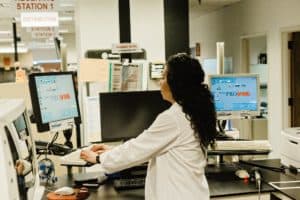What is Clinical Informatics?
Clinical informaticians are physicians, health information technology (IT) professionals, and – above all – leaders. They bridge the gap between the transformative potential of technology and the knowledge needed to apply health IT in the clinical setting.
State-of-the-Art Training
The UAMS Department of Biomedical Informatics (DBMI) is home to the UAMS Clinical Informatics Fellowship Training Program, which provides state-of-the-art training and broad informatics experience for physicians pursuing advanced medical subspecialty training in applied Clinical Informatics.
Our two-year program is ACGME-accredited. Eligible applicants have successfully completed an accredited residency program in a primary medical specialty (i.e., pediatrics, internal medicine, etc.). There are two training sites for the program: Arkansas Children’s Hospital and UAMS Medical Center. The fellow stationed at each site may also perform clinical duties at that location amounting to up to 20% of their time.
When & How to Apply
The UAMS Clinical Informatics Fellowship Program follows the July-start fellowship program time table. We take applications through ERAS. Our program can be found nested under Pediatrics, although we take applications from applicants with backgrounds in adult and pediatric specialties.
Applicants can typically begin submitting applications in July. Programs may begin looking at them a few weeks later. Our program typically holds interviews in October and November. All of our program’s fellowship interviews are virtual. The Clinical Informatics subspecialty match process is hosted by the American Medical Informatics Association (AMIA), typically in December, through its own process and match algorithm outside of ERAS. Participants typically need to join AMIA to participate. There is a student membership option.
Integrated Training Experience or “Dual Fellowships”
Our program is able to offer integrated training experiences, commonly known as “dual fellowships,” in which fellows complete two fellowship programs at once. Often, the research year is combined to reduce the overall duration of the training experience that the two individual fellowships would otherwise take if done separately and consecutively.
These proposals much be approved by the boards governing both subspecialties.
This opportunity is possible for both incoming applicants and current fellows at UAMS or Arkansas Children’s. However, the logistics can take some time to arrange. If interested, the sooner you reach out, the better.
Contact: Clinical Informatics Fellowship Program Coordinator Kim Aeilts at kaeilts@uams.edu.
Program Aims
Our program leadership have several aims:
- Establish a nationally-recognized Clinical Informatics medical subspecialty training program for UAMS and State of Arkansas.
- Educate culturally and academically competent Clinical Informatics professionals equipped to providing high-quality, innovative, patient- and family-centered health care through evidence-based Clinical Informatics practices.
- Establish an integrated, supported educational training experience for Clinical Informatics trainees in UAMS.
- Develop the Clinical Informatics research, educational and technical assistance expertise that promote the improvements in quality and safety of care for UAMS and the State of Arkansas.
What does that mean for our fellows? As part of our program, you can expect to:
- Improve the Clinical Informatics systems used in quality of care and patient safety.
- Identify Clinical Informatics-related problems in healthcare and develop solutions.
- Commit to a culture of lifelong learning by developing a broad awareness of Clinical Informatics literature, as well as resources and skills from other disciplines that enable clinical informaticians to be more effective.
- Develop leadership skills by hands-on practice managing project implementation and deployment.
- Contribute to Clinical Informatics research.
- Build a foundation of knowledge, experience, and relationships to enable continued academic contributions to the discipline of Clinical Informatics.
The Program
The program includes up to 60 hours per week of learning hours and contains several components: didactics, rotations, operational duties, clinical responsibilities, and a senior research project.
- Didactics — Up to six hours a week – Includes time attributed to the Biomedical Informatics Certificate program and other learning activities, such as conferences and Journal Club.
- Rotations – Up to 18 hours per week – Year one includes 10 mandatory rotations and two electives. Year two is all electives. Rotations are designed to expose the fellows to specific informatics areas of interest to the specialty. Rotations will likely overlap with the fellow’s research and/or operational interests in Year two.
- Operational Responsibilities – Up to 24 hours per week – The operational responsibilities allow the fellow to develop real-world informatics skills and their ability to lead.
- Clinical responsibilities – Optional for up to 20% of fellow time, for a maximum of about 12 hours per week – See more detail below.
- Research – Fellows begin working on their research project in Year 1 of the program, with the goal of completion, presentation(s) and publication by the end of Year two.
Program coursework is part of the Clinical Informatics track of our graduate degree program in Biomedical Informatics. Fellows are required to complete a Certificate Degree in Biomedical Informatics, which can be used to complete a Master of Science Degree in Biomedical Informatics.
Fellows are also required to successfully complete the EPIC Physician Builder training series that is complementary to the fellow’s clinical specialty of interest.
Clinical Practice

The Clinical Informatics Fellowship Program coordinates with the appropriate clinical or surgical specialty in the UAMS College of Medicine to allow fellows to continue to practice in their primary medical specialty.
Fellows have the option to spend up to 20% of their time in clinical practice.
Learn More About Clinical Informatics
The ACGME defines Clinical Informatics as a subspecialty of all medical specialties that transforms health care by analyzing, designing, implementing, and evaluating information and communication systems to improve patient care, enhance access to care, advance individual and population health outcomes, and strengthen the clinician-patient relationship.
Physicians who practice clinical informatics draw from the broader field of biomedical and health information IT as they apply informatics methods, concepts, and tools to the practice of medicine. Clinical informaticians must understand the culture, boundaries, and complexities of the field, including how stakeholders, structures, and processes affect the information and knowledge needs of health care professionals. These interconnected factors influence the selection and implementation of clinical information processes and systems. Clinical informaticians must understand these nuances in order to be effective leaders in the field.
Physicians who practice clinical informatics collaborate with other health care and IT professionals and provide consultative services. They use their knowledge of patient care – combined with their understanding of informatics concepts, methods, and health IT tools – to improve clinical practice by:
- Leading initiatives designed to enhance health care quality and access by supporting and facilitating care coordination and transitions of care through the procurement, customization, development, implementation, management, evaluation, and continuous improvement of clinical information systems.
- Securing the legal and ethical use of clinical information.
- Assessing information and knowledge needs of health care professionals and patients.
- Characterizing, evaluating, and refining clinical processes.
- Analyzing, developing, implementing, and refining clinical decision support systems.
- Participating in projects designed to use technology to promote patient care that is safe, efficient, effective, timely, patient-centered, and equitable.
Program Contacts
Feliciano “Pele” Yu, Jr., M.D., MSPH, MSHI, FAMIA
- Program Director, UAMS Clinical Informatics Fellowship Program
- Fellowship Training Site Director for Arkansas Children’s Hospital
- Professor of Pediatrics, Biomedical Informatics, and Public Health, University of Arkansas for Medical Sciences
- Chief Medical Information Officer, Arkansas Children’s Hospital
- Board-certified in Pediatrics and Clinical Informatics
Email: FBYu@uams.edu
 Kim Aeilts
Kim Aeilts
GME Clinical Informatics Fellowship Program Coordinator
Email: kaeilts@uams.edu


